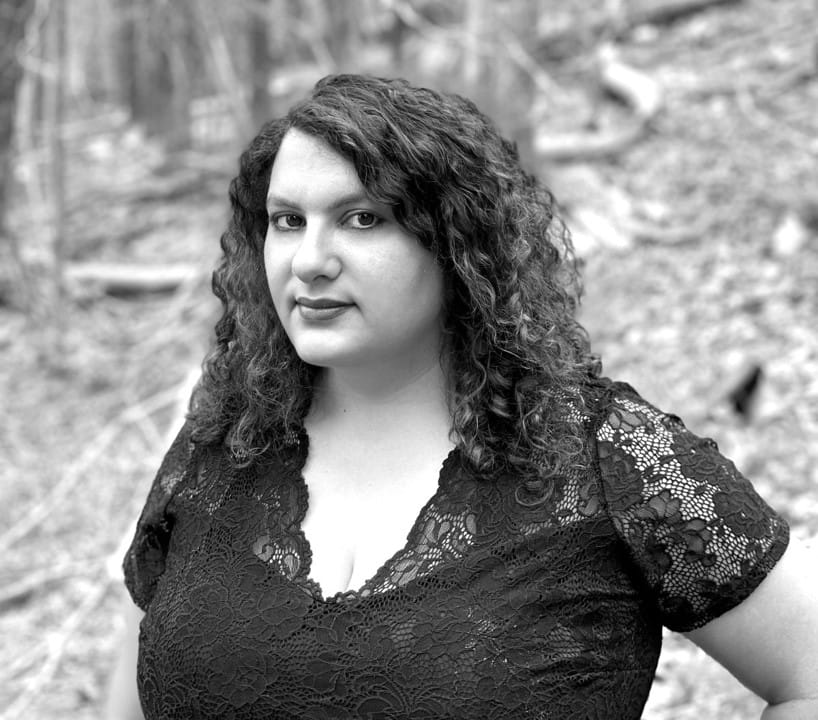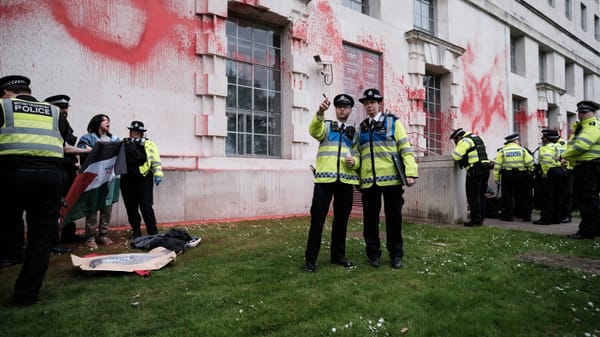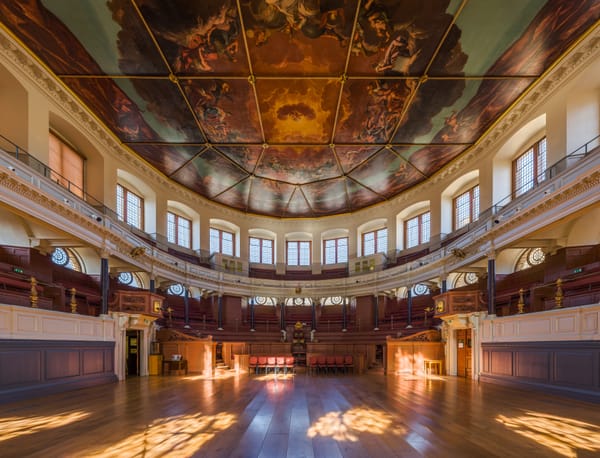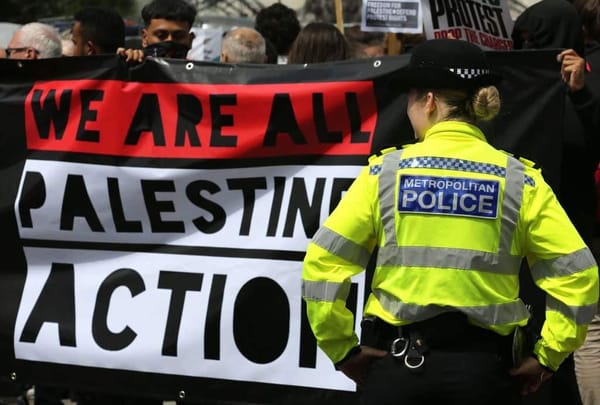An audience with Talia Lavin, American Nazi-hunter
Like a schlubby Jewish Virgil, the American journalist leads readers of her new book through the circles of white supremacist hell.

Talia Lavin is that thing I have always wanted to be: a divorcée. A woman who has advanced to the god tier of not giving a fuck. Who breakfasts on simps and dines on trolls. Who thrives on controversy and at times, manufactures it for fun. A woman who wields her attractiveness so terrifyingly that you fear she could as easily slay you with a frosty look as with her replica Anduril sword.
Lavin shot to fame after she left the New Yorker and has gone from strength to strength ever since. She’s written for a smorgasbord of fancy publications, terrorised Rudy Giuliani and now, she has a book out. The book is good, mainly because it showcases not only Lavin’s journalistic skill, but also her insatiable appetite for mischief.
Culture Warlords: My Journey into the Dark Web of White Supremacy is written, as the subtitle suggests, as a quest narrative: “The moment I saw [the violently antisemitic comments underneath the Jewish Telegraphic Agency articles she was moderating],” Lavin recalls, “I knew this was a battle I had to wage. I was going to learn what I needed, and I was going to fight.” She writes as if in character, and later devises herself one – Ashlynn – to infiltrate far-right forums.
Lavin’s quest is not only to expose America’s underground fascists, but to avenge herself on them; she describes the book as “part revenge, part explainer”. In true gonzo fashion, Culture Warlords abandons the objectivity commonly attempted by chroniclers of the far right. Lavin doesn’t suppress the loathing that motivates her reporting; why give yourself an ulcer?
There is a flipside to Lavin’s biblical pursuit of an eye or tooth. It’s often said that one of the silver linings of Trump’s presidency was how it mobilised his opponents – the liberal pink pussy hatters who marched down Independence Avenue the day after his inauguration; the Democratic Socialists of America whose ranks swelled from 8,000 in 2016 to 75,000 today; the “transgender Black Marxists” who kept Republicans up at night – yet under Biden, the reverse will also be true. For as ramshackle kletzmer filled the Philadelphia streets with riotous joy as news broke of his victory, not everyone was celebrating – notably the police force which, as Lavin explains below, is “marinated in white supremacy”. The sun is setting on America’s would-be despot and it is only a matter of time before far-right grief turns to far-right rage, and a burning desire for revenge.
Rivkah Brown, editor of Vashti
The below interview has been edited for length and clarity.
You describe the book as “part revenge, part explainer”. Why did you decide to write from within your own hatred, rather than the cool-headed observer position more commonly assumed by journalists?
I think the position of “objectivity”, at least in US journalism, often takes the form of a kind of moral toddlerism – a position of perennial surprise at the world, as if all facts and common sense must be thrown out the window and recreated anew. It is almost as if mainstream political journalists in the United States suffer a kind of Promethean ailment: each morning, an eagle draped in an American flag swoops down and removes their temporal lobe. Trump is constantly on the verge of a “new tone”, climate change is still a “debate”, and it is perennially shocking when police departments engage in violence or politicians are hypocritical. I decided to write this book as a rebuke of that faux objectivity – particularly because it has led to some truly disastrous, mealy-mouthed coverage of the far right, all those profiles of “dapper Nazis”. The properties of this kind of “fair-minded” journalism are, I find, uniquely unfit for addressing such a malevolent movement.
I started writing with the idea of being a schlubby Jewish Virgil, inducting the reader, like Dante, into the circles of white supremacist hell.
I wrote from my viewpoint as a Jewish woman who has experienced vicious harassment from the far right for years. I don’t think it was incumbent upon me to excise these experiences; to the contrary, I think that knowing that far-right organising is not a subject of mere intellectual fascination makes the book stronger.
I started writing with the idea of being a schlubby Jewish Virgil, inducting the reader, like Dante, into the circles of white supremacist hell. And so I set out to be as transparent a guide as possible, that these were the fleurs du mal grown from a morass of hate that I was telling you about, and to which I was already quite militantly opposed. It is not a dispassionate book, but it is a true book, and I do not find passion and truth to be opposed. I am passionate about combating the white power movement and I hope to imbue the reader with some of my passion.
You argue that, while white supremacists have been emboldened by Trump, they have also deemed his rhetoric “cynical pandering, unlikely to be backed up with the violent genocidal politics they yearned for”. How would you characterise the President’s relationship with the white power movement?
This movement is not monolithic. But the general sense I have gotten is an initial infatuation followed by years of disillusionment. His transparently white nationalist campaign, marinating in racial invective; his encouragement of white-nationalist violence during his campaign, for example in an incident when two supporters of his beat up and urinated on a Latino homeless man and he praised them as “passionate”. These were not dog whistles, they were foghorns. And his victory was an enormous surge of adrenaline, a recruitment ad for the white-power movement. Entire new far-right groups sprang up like mushrooms after a flood, fed on Trump’s rhetoric; the Republican Party as a whole has embraced white nationalism with considerable fervour.
On the other hand, while Trump has co-opted the Republican party in significant ways, reshaping it in his own image, the influence has not been one-way. If white power movementarians fantasised about joining a contemporary Einsatzgruppen [Nazi paramilitary death squads], about blood flowing through the streets, that hasn’t quite happened. There’s been a focus on things like tax cuts and deregulation – typical conservative priorities. The US has not quite devolved into open racial warfare on the streets, and that is a point of dissatisfaction on the far right.
There is also the fact that the Trump administration has and continues to employ Jews in prominent positions – Gary Cohn, Jared Kushner, Steven Mnuchin, et. al. Trump’s daughter is married to a Jew; this has been used as a mealy-mouthed point in his defense by Trumpists who protest the idea that the president is associated with Nazis. In truth I have seen many iterations of the sentiment that Trump has “allowed” his white daughter to be corrupted by a Jew, that he is a slave to the Zionist agenda. The movement of the American embassy in Israel to Jerusalem – a huge selling point to US Christian evangelicals, whose apocalyptic Christian Zionism is a massive influence over this administration – was also a sticking point. Jews in general are a sticking point in this relationship.
Of course they still prefer Trump to Biden, he is still “their guy”, more so than the guy running with a Black woman VP. But there has been a disillusionment with electoralism in general in favor of more extra-systemic violence. He may still be able to influence them, but they are cynical about him; to them he is in many ways just another politician, unable to make the country judenrein [free of Jews], the open racism of his administration notwithstanding. They are not necessarily thrilled to go out and vote for him anymore. There is of course a pulsing vein of violent and vigilante racism in mainstream MAGA Trump-support, but my book primarily addresses the white power movement outside that frame.
You describe the complicity of the police in enabling fascism and urge the reader not to confuse state legitimacy with moral authority. What role can hate crime legislation or social media regulations play in the fight against fascism?
I am sceptical of the idea that US law enforcement can play a pivotal role in defanging or deracinating the white supremacist movement. Studies have shown time and again that US law enforcement is absolutely marinated in white supremacy; police departments are rife with members of hate groups, and disproportionately mete out violence against minorities, particularly Black and Native American communities. The intelligence apparatus was built to fight the War on Terror, to surveil Muslims. In general the prospect of law enforcement versus white supremacists is like fighting oil with oil. And in an environment as punitive and carceral as the United States I am not sure hate crime legislation is really the solution.
The metastasis of white supremacist activity on social media is a problem that could have been anticipated. The KKK were among the earliest adopters of the Internet.
The social media companies are another matter. I think these runaway monopolies should be reined in, and there’s growing political consensus for that. More liability for what’s published on these platforms, antitrust legislation, things that would send them scrambling a bit – I am in favour of that. But as I point out in the book, the metastasis of white supremacist activity on social media is a problem that could have been anticipated. The KKK were among the earliest adopters of the Internet, using it for recruitment in the early 1980s. They realised its immediacy, its combination of intimacy and anonymity, made it the perfect tool. The fact that the founders of Google and Facebook and Twitter didn’t bother to anticipate this problem indicates just how much they care about their users who are minorities, women, Jews, Black people, trans people, Muslim people, being viciously harassed and placed at risk, or being targeted for violence. These companies are not the locus of our salvation, although I would love to be proven wrong; I would far rather be a false prophet than a Cassandra.
In their book Reactionary Democracy: How Racism and the Populist Far Right Became Mainstream, Aaron Winter and Aurelien Mondon argue that “the rise and mainstreaming of the far right not only distract us from existing systemic racism, but legitimise its cruder expressions by giving them platforms. This has served to place concerns about systemic racism further in the back of the liberal mind, as it focuses instead on the extreme and far right”. Is there a risk that focusing on racism’s most extreme manifestations obscures its more quotidian ones?
Systemic racism in the United States is clear, perhaps has never been clearer. The white power movement feeds off that, and the mainstream right in the United States has tilted further and further right until the lines between white power and the Republican Party are significantly blurred. Systemic racism and its depredations claim so many lives: in terms of pandemic response, police violence, mass incarceration, our utter lack of a social safety net, healthcare discrimination. There is a desire among many people to identify racism as a KKK hood or swastika, and not to look deeper into its more nuanced manifestations – and their own complicity in those systems. The vast majority of racist violence in the United States takes place under the imprimatur of the state – either brutally at the hands of its armed agents, or through neglect.
There is a desire among many people to identify racism as a KKK hood or swastika, and not to look deeper into its more nuanced manifestations – and their own complicity in those systems.
That said, I think there’s value in writing a book about the white power movement and its violence because they do have a propensity for, you know, shooting up synagogues and Black churches. And I think understanding the ideologies that underlie this movement allow you to understand some of the motivations for other forms of racism as well. Some of the assumptions that white power movementarians crow about – that immigrants are diluting the white race, that Jews are nefarious architects of all that is evil in this world – are more mainstream than you might think, if more covertly expressed. Understanding those ideas makes you a better guardian against their broader manifestations.
Trump’s bigotry against Mexicans, Muslims and Black people has been vociferous and unabashed. Generally speaking, Jews have not been as frequently at the sharp end of the President’s racist invectives or policies, despite antisemitism being a pillar of the white supremacism on which he leans. Why?
I think there are two answers to this. The primary reason is that evangelical Christians are a massive part of Trump’s base and a deeply engaged constituency for the right wing in America. And evangelicals have a marked propensity towards Christian Zionism – a millenarian, apocalyptic vision in which all Jews must resettle in Israel in order to be converted or perish when Jesus returns. It’s stark that such a vision, straight from Revelation, has a direct influence on governmental policy, but the US is a deeply Christian country, and the evangelical minority has outsize power in right-wing politics. There’s also an intense, frankly uncomfortable philosemitism from those circles, stemming from this idea that Jews are chosen, destined, to be the ushers of their Messiah. So antisemitism on the mainstream right – of the open sort, although there is plenty of dark intimation about George Soros – tends to hide behind a veil of plausible deniability, cloaked in Zionism and philosemitism.
Antisemitism is often used as a cudgel by the right against the left … This does not mean there is no antisemitism on the left; antisemitism is trans-partisan. But the people who are shooting up synagogues are on the far right – period.
In addition, antisemitism is often used as a cudgel by the right against the left in the United States, because the left has been more open to embracing Palestinian rights, or because Muslim-Americans have been involved in left politics. It’s a crude, racist use of antisemitism that does nothing to help anyone. This does not mean there is no antisemitism on the left; antisemitism is trans-partisan. But the people who are shooting up synagogues are on the far right – period.
There’s a lot of winking towards antisemitism from the Trump orbit. And as I’ve written in the book and elsewhere, you can’t encourage the forces of white nationalism without encouraging antisemitism; they are inseparable.
It has become routine for commentators to speak of “left- and right-wing antisemitism” as if the two are comparable. How has this happened?
Part of the moral toddlerism I reference above is an almost pathological need to balance every bit of coverage, even when reality is substantially imbalanced. So that what is a problem on the right must be an equal and opposite problem on the left, even when one side contains proud swastika-wavers and one does not. Antisemitism absolutely does exist on the left and we should not be afraid to name that and to call it out, and to demand, as we give fellowship and community and show solidarity, to receive solidarity, fellowship, community and protection in return. But I think this pathology of balance, and the ways in which the right uses antisemitism as a cudgel, these are the reasons the spectre of left-wing antisemitism has arisen as a rhetorically equal threat to the far-right, even if that’s factually inaccurate.
You speak of how Jews live with a “fear of slaughter”. Obviously, this fear is justified: we’ve just passed the two-year anniversary of the Tree of Life massacre. Yet is it always constructive? How do we balance a sensitivity to threat with a commitment to broad-based struggle?
I think a lot about epigenetics, about intergenerational trauma. My mother lost a sister in the Holocaust, my grandparents lost their entire families. There has always been a readiness to run coursing in our veins. Keeping that family history close to me, understanding it, I have found it a source of moral clarity in writing about far-right, fascist organising. It has allowed me to stay clear on the wages of this kind of genocidal speech and thought. And that organising is not directed solely against Jews, even if Jews are one of their top targets. The Holocaust targeted Roma, gay people, disabled people. Keeping its memory close enabled me to write about another inheritor movement with the same goals, an eliminationist movement that seeks the destruction of Black and Muslim and trans and gay Americans along with Jewish Americans. So in that sense I have found it useful: that the urgency of fear provides moral clarity, and from that place of clarity, I am able to describe something with violent and terrible consequences for a whole coalition of people.
“Over the course of writing this book,” you write, “I had to leave my own skin. And sometimes what I found made me want to never return to it”. You speak of becoming “unrecognisable to myself”, even of sinking into a deep depression. How has the process of writing Culture Warlords conditioned your relationship with your Jewishness?
I felt my Jewishness burning inside me all the time. I am a very Jewy Jew, and always have been – the Modern Orthodox education that has left me imprinted with all kinds of biblical and Talmudic references, and my hyper-Ashkenazi looks, big nose, curly hair, matronly bosom – and the neurosis, the stereotypical neurosis. I walk through my life like a female character in a Philip Roth novel, except I am not tertiary in my own life. (I have often wanted to be a female Philip Roth: coarse, urgent, crude and eloquent. Perhaps in another life, I will get to write those books.)
There are huge, running threads on the Internet about my Jewish cunning, my Jewish evil, my Jewish perversion – even an elaborate conspiracy theory that I have a sexual fetish for being humiliated by Nazis. (This is not the case.) Of course this warps and distorts one’s view of oneself. But I am proud to be a Jew.
But it is one thing to relate strongly to your own identity, and another thing to be attacked for it, daily, for years. Because of how the far right draws on misogyny as its lifeblood, I endure grotesque, specific harassment about my body as a manifestation of my Jewishness. I have listened in as neo-Nazis described me being too ugly to rape except with a double-barreled shotgun. There are huge, running threads on the Internet about my Jewish cunning, my Jewish evil, my Jewish perversion – even an elaborate conspiracy theory that I have a sexual fetish for being humiliated by Nazis. (This is not the case.) Of course this warps and distorts one’s view of oneself. But I am proud to be a Jew. I grew up with Torah on my lips, and while I moved away from Orthodoxy, there’s a calfskin Shema furled up in my soul somewhere, a mezuzah hung on my body. This is Jewish territory.
As someone who clearly enjoys cosplay in their day-to-day life, we wonder whether you found impersonating Ashlynn perversely compelling? Was it hard to leave her behind?
Do you mean the swords? That’s not a cosplay thing, I don’t dress up like an elf. I just own about six swords including the dagger. Listen, I just enjoy bladed weaponry. We all have hobbies. Mine include having weapons to hand, given the subject matter I write about and the daily death threats. But no, I don’t cosplay.
To be able to deceive the people who spew this rhetoric, who have these desires to make the world judenrein – to have them bare their souls to you, not knowing that you are their nightmare, that is satisfying. There is an acrid pleasure in getting one over on these bastards.
Ashlynn was in some sense a creative endeavor, a form of play – let’s see what we can get away with. You know, that’s a pretty thrilling feeling. There’s also the fact that to be able to deceive the people who spew this rhetoric, who have these desires to make the world judenrein [free of Jews] – to have them bare their souls to you, not knowing that you are their nightmare, that is satisfying. There is an acrid pleasure in getting one over on these bastards.
The roleplay itself was not necessarily enjoyable, though; I didn’t like spewing that garbage, even knowing it was for the broader purpose of exposing them. I was glad to leave her behind. I have assumed new identities now, in different groups. I’m still watching.
You say you took up cooking again after the book to restore the love of which the writing process had voided you. What do you cook?
Immersing oneself in this kind of hatred sort of cuts you off from the world; you feel you’re in your own bell jar, sealed off from all things that are good. For me, cooking has always been a means of showing that I love others. To cook is to affirmatively move towards the world, towards what is warm and nourishing, towards love.
I like soups: borscht, avgolemono, matzo ball soup. I am quite good at roasting a chicken. I like little new potatoes smashed with garlic, I like lemony-buttery salmon, I like roasting beets in foil and peeling them so that my hands are purple-scarlet and serving them warm, with salty goat’s cheese just barely melting against their taut flesh. I like ground beef with rice and cinnamon and red wine. Assembling a meal, assembling myself. ▼
Culture Warlords is published by Monoray on Thursday and is available to pre-order here.
A previous version of this article stated that Lavin was fired from the New Yorker. In fact, she resigned.




